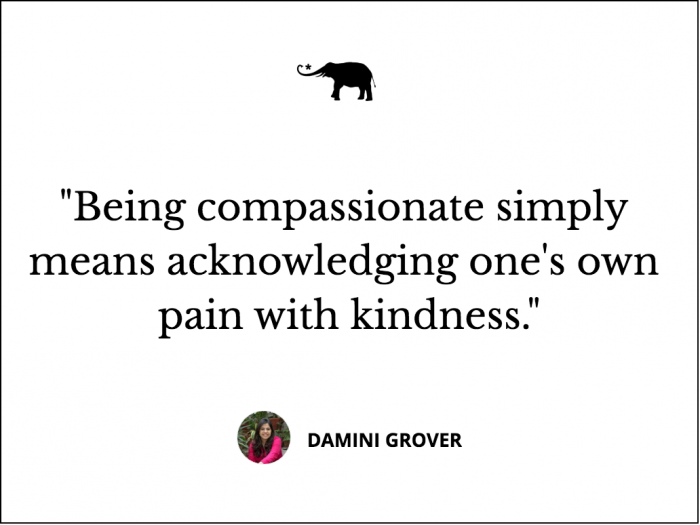View this post on Instagram
“Compassion is even more powerful than courage. Sure, with courage you can conquer the world, but only with compassion you can heal and build it.” ~ Rasheed Ogunlaru
When we are going through troubled times, gripped by our own insecurities and fears, and carrying the pain of our wounds everywhere, we are often told to be courageous.
We are told either by the world, or even by our own selves, that we need to be strong, pull it together, and fight it out.
How many times do we hear that we need to be compassionate toward our wounded, hurt, and broken parts?
There have been numerous occasions where I forced myself to keep going on when I actually needed rest. For the longest time, I thought that the only way to overcome pain and anguish was to bury it under the surface—out of sight, out of mind. Until one day, I had piled on way too much, and I was forced to acknowledge it. And even when I did, I could only judge, criticize, and belittle myself for being weak, inadequate, imperfect, and vulnerable. But I learnt.
As I continued to heal people, parts of me began to heal. What was I doing that was helping them so much? Was it the bookish knowledge and theory that was helping them heal or was it about the numerous worksheets that I would give them at end of the session?
Over time, I realized it was more than theory, knowledge, research, tools, and techniques: I was offering them compassion. It was about speaking to their hurting, rejected, broken, and traumatized parts from a place of gentleness and kindness, and most importantly, I was acknowledging that their pain was valid and deserved to be seen, heard, and respected.
The more I did for others, the more I was able to learn to be compassionate toward my own self.
Therefore, compassion heals even the deepest of wounds.
Yet, we all struggle with practicing it.
Being compassionate simply means acknowledging one’s own pain with kindness—stripping it off of all labels and judgements of being “weak,” “incompetent,” and “incapable.” It means treating ourselves with kindness and respect, especially when we are not our best selves. If we can do it for others, we can surely do it for ourselves.
Very often, when we are in great pain, we don’t treat ourselves too well, and that only aggravates that pain. It’s almost as if we get hurt and then we step on that hurt with all our might. It only hurts more.
To heal, we need to hold ourselves kindly. We need to move away from tearing ourselves apart in every possible way, to putting us back together delicately. The fact is that we heal when we feel heard, validated, and valued for what we have gone through. It’s almost and always the absence of this holding that wounds us.
While criticizing and judging comes to us naturally, compassion for self does not.
Here’s what building compassion toward the self involves:
Acknowledging our own pain. We don’t heal by running away; we heal by looking at our wounds and tending to them. It’s letting our thoughts and emotions come up without any judgement. It’s acknowledging that, “Yes, I am hurting,” or, “I am feeling angry.”
It’s moving away from judgement and calling ourselves “losers” or “weak” or “incapable of handling my emotions” or even questioning why we feel a certain way.
Responding with kindness. Telling ourselves that it’s okay, I will get through this, or perhaps, I am only human after all, or even doing things that can help us feel better in our moments of distress. If we can speak with kindness to our loved ones, help them to feel supported in their tough times, why not do it for ourselves?
Acceptance. Often, when our difficult thoughts and feelings show up, we want to push them away or minimize their significance. It may provide short-term relief, but only causes long-term damage. While we may not like what’s showing up for us, but until and unless we accept it (aka as make room for it and see its presence), we won’t be able to heal.
Validation. When we are in pain, it’s helpful and soothing when someone else tells us that our feelings are valid. How often do we do that for ourselves? Validating our emotions doesn’t mean getting into a right-wrong debate. It simply means giving our thoughts, opinions, experiences, and emotions the respect and space they deserve. It’s simply saying they are a part of us being a human. We compare our pain to others, we shut it down, we tell ourselves to suck it up and move on—but that doesn’t work.
Connectedness. The fact is that human connection is vital to healing. We only perish in isolation; we heal in connections. It’s important to reach out to people whom we can trust so that we can get through these troubled times with love, care, and support.
It’s only when we begin to see ourselves as humans do we realise that kindness and compassion are the glue that holds everyone together. It’s the only thing that binds us to our own self.
That’s how we heal.
“You’ve been criticising yourself for years and it hasn’t worked. Try approving of yourself and see what happens.” ~ Louise L. Hay
~












Read 35 comments and reply